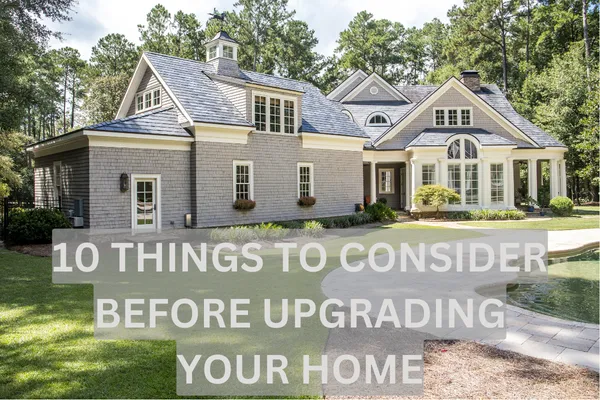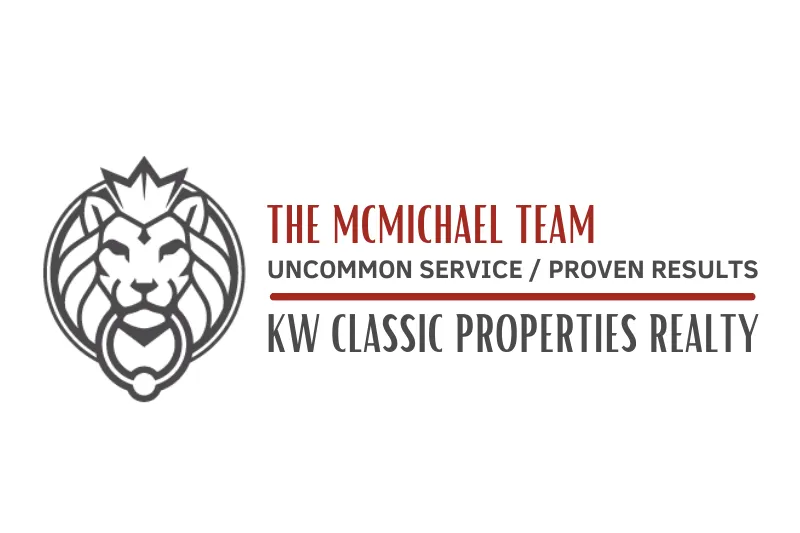Sell Your Columbus,Ohio Home Quickly With The McMichael-Liston Team
Join tons of highly satisfied homeowners who have worked with The McMicheal-Liston Team to sell their home quickly and for top dollar.
or call us at (614) 766-7766 today!
Are you ready to sell your house? Fill out this simple form or call (614) 769-7766.
Know Why You are Selling
If you know exactly why you are selling then it is easier for you to follow the right plan of action for getting what you want.
If you are a seller who needs to close a sale as quickly as possible, then you should know that getting the highest price possible is not one of your priorities. It does not mean that you won’t or cannot get the highest price, but it means that the price is not the deciding factor.
A buyer who can give you a quick closing time will appeal much more to you than a buyer who can offer you more money but the negotiation and closing time drag on.
It’s always good to know how low you will go, in terms of selling price. This will help to eliminate some of the offers that you find simply offensive or ridiculous. Even though you should consider all offers seriously and take into consideration the terms of each offer, sometimes, if you know the bottom line and are strict about it, you can save yourself time.
Once you know what your limits and reasons are, discuss them with your agent so that they can help you set your goals realistically. If you decide to list your home on your own, make sure you do research on the current market, and you get the proper advice you need in terms of legal issues, etc. The key is to be realistic and to know what your goals are so they can be met.
Plan of Action
- Analyze why you are selling – If you understand your motives, you will be able to better negotiate and to get what it is that you want, whether it be a quick sale, high price, or somewhere in the middle.
- Prepare your home for the buyer – Maximize the strengths of your property and fix up its weaknesses. You want the buyer to walk away from your home with a lasting good impression.
- Find a good real estate agent that understands your needs – Make sure that your agent is loyal to you, and can negotiate to help you achieve your goals. In addition, they should be assertive and honest with both you and the buyer.
- Be prepared for negotiation – Learn and understand your buyer’s situation; what are their motives? Can you demand a big deposit from them? Try to lock in the buyer so that the deal goes through.
- Negotiate for the best price and the best terms – Learn how to counter offer to get maximum value from every offer.
- Make sure the contract is accurate and complete – Be honest with your disclosures; you do not want to lose the deal because you were lying or diminishing your home’s defects. Insist the buyers get a professional inspection. This will protect both you and the buyer.
Finding the Right Agent
Not all agents work the same way. The most important attribute of an agent is that he/she is well connected to the real estate industry. He/she should know the market and provide information on past sales, current listings, his or her marketing plan, and at least 4 solid references. In addition, you also want to look for an agent that is honest, assertive, and one that best understands your needs.
Try to go with a local agent. They can better serve your needs because they should be more familiar with the local market conditions, local prices, and what’s hot or not in your community.
Considering Offers
When reading an offer, keep in mind that you are out to get the best price AND the best terms for you. If you focus solely on the price, you may overlook terms that could be favorable to you as a seller.
Some terms that may work in your favor:
higher-than-market-interest in a second mortgage for your home
the buyer will pay for most or all of the closing costs
the buyer will take care of any repairs
quick close – the buyer is pre-approved, ready to close in a timeframe that best suits you
all-cash deal
When reading through offers, remember to look at the whole package. Take the time that you need to assess what is being offered and if it meets your needs.
Setting the Price
The price is the first thing buyers notice about your property. If you set your price too high, then the chance of alienating buyers is higher. You want your house to be taken seriously, and the asking price reflects how serious you are about selling your home.
Several factors will contribute to your final decision. First, you should compare your house to others that are in the market. If you use an agent, he/she will provide you with a CMA (Comparative Market Analysis). The CMA will reflect the following:
houses in your price range and area that were sold within the last half-year
asking and selling prices of houses
current inventory of houses on the market
features of each house on the market
For Sale By Owner – A Good Idea?
FSBO (pronounced fizz-bo), or For Sale By Owner, is a way of selling your home without the use of a professional real estate agent or broker. The idea behind FSBO is that by selling your home yourself, you save the approximate 6% that would be the agents’ commission.
6% may not sound like a lot, but it can add up, especially on more expensive homes. But before you run off and decide to sell your home FSBO, you must remember that to get savings like that, there must be a cost. So what’s the catch? Selling FSBO is hard. A lot harder.
Only about 10% of sellers that decide to do FSBO are successful at it. And not all of them end up saving themselves money. FSBO sellers often end up accepting a lower price for their home than they would with an agent.
There are of course other issues as well. Can you afford to make selling your home your full-time job? Because for a lot of FSBO sellers, that’s exactly what it is. Do you have the time and capital to spend on the marketing, advertising, inspections, paperwork, phone calls, showings, and problems that come up when any home is sold?
Selling with a professional agent also has other advantages. An agent can get your home listed on the MLS (Multiple Listing Service) and other popular websites where not only homebuyers but also other agents can easily find it. Professional real estate agents also have an extensive network that allows them to more easily find a buyer.
So before you decide to sell your home yourself, thoughtfully consider just how much time and effort you can spare for selling your home, as well as how important it is that your home sell sooner rather than later.
Recent Posts

10 Things to Consider Before Upgrading to a Larger Home
“The ultimate luxury is being able to relax and enjoy your home.” - Jeff Lincoln
Introduction:
The prospect of moving into a larger home is often accompanied by excitement and anticipation. However, this significant decision requires thorough consideration. Before making the leap to a more substantial residence, it's essential to delve into various crucial factors to ensure a seamless transition and a fulfilling experience.

Does your current living space accommodate a growing family?
Evaluate Your Current Needs
Assessing Your Current Living Situation
Start by closely examining your existing living arrangement. Assess whether your current home genuinely feels cramped or if there are opportunities to optimize the layout more efficiently. This self-reflection can help you identify if the need for a larger home is genuine.
Identifying Specific Needs and Goals
Consider the specific factors driving your desire for more space. Is it the need for an extra bedroom to accommodate a growing family? Perhaps a larger kitchen for culinary endeavors? Identifying these specific needs and goals will guide your search for a larger home tailored to your lifestyle.
Budget and Financial Readiness
Determine Your Budget
Establishing a well-defined budget is paramount when considering an upgrade to a larger home. It's not just about the purchase price; you must also account for additional expenses, including property taxes, insurance, and potential renovations. Ensuring your budget aligns with your long-term financial goals is crucial.
Consider Mortgage Options
Delve into various mortgage options available to you. Analyze interest rates, down payment requirements, and loan terms to find a mortgage solution that aligns with your financial situation. Consulting a financial advisor or mortgage specialist can provide valuable insights.
Home Equity and Existing Mortgage
Understanding Your Home Equity
If you currently own a home, evaluate the amount of equity you've built over time. Home equity can be a valuable asset, serving as a substantial down payment for your larger home. Understanding your equity position is essential when planning your upgrade.
Options for Handling Your Existing Mortgage
Deciding what to do with your existing mortgage is a critical step. You can choose to sell your current home and pay off the mortgage, or explore options like renting it out if it aligns with your financial strategy. Each choice has its implications, and careful consideration is necessary.
Long-term Goals
Consider Your Long-term Objectives
Think beyond immediate needs. Reflect on your long-term life objectives, such as family expansion, retirement plans, or potential investments. Evaluate how a larger home fits into these overarching goals.
How a Larger Home Fits into Your Plans
Ensure that upgrading to a larger home aligns seamlessly with your long-term objectives. It should be a decision that contributes positively to your financial stability and overall well-being, supporting your future aspirations.
Location Matters
The Significance of Location
Location plays a pivotal role in your quality of life. Examine the neighborhoods you're interested in, considering factors like proximity to your workplace, access to quality schools, availability of essential amenities, and ease of commute.
Proximity to Work, Schools, and Amenities
Select a location that offers convenience and meets your family's needs. Proximity to your workplace can reduce commuting stress, quality schools can provide an excellent education for your children, and easy access to amenities can enhance your daily life.
Maintenance and Upkeep
The Implications of a Larger Home
Understand that a larger home may entail increased maintenance and upkeep responsibilities. It's vital to consider whether you're prepared for the additional time and effort required to maintain a larger property.
The Commitment to Maintenance
Factor in the time and financial commitment needed for regular maintenance, including landscaping, repairs, and higher utility costs. Adequate preparation can prevent surprises and ensure you maintain your new home effectively.
Future Expenses
Anticipate Future Costs
As you plan for your larger home, anticipate future expenses. Account for potential costs related to home renovations or upgrades. Budgeting for these expenses will prevent financial strain down the road.
Preparing for Unexpected Expenses
It's wise to establish an emergency fund to cover unexpected expenses, such as major repairs or unforeseen medical bills. Having this financial safety net in place can provide peace of mind during your homeownership journey.
Resale Value
How Upgrading Affects Resale Value
Consider how upgrading to a larger home may impact its resale value. Choose features and improvements that not only enhance your current lifestyle but also have a positive influence on the property's future marketability.
Investment Potential
View your larger home as an investment. Aim to make choices that not only fulfill your immediate needs but also increase the property's value over time. Strategic decisions can lead to a financially rewarding homeownership experience.
Emotional Considerations
Emotional Attachment to Your Current Home
Recognize that leaving your current home may come with emotional attachments. Preparing yourself and your family for the emotional aspects of moving is essential. Open conversations can help ease the emotional transition.
Preparing Emotionally for the Transition
Discuss the move with your family and address any emotional concerns or sentimental attachments to your current home. Creating a positive outlook and focusing on the opportunities of the new home can make the transition smoother.
Timing and Market Conditions
Timing Your Upgrade
Consider the timing of your upgrade in conjunction with market conditions and your personal circumstances. Assess whether the current market presents favorable conditions for purchasing a larger home.
Market Conditions and Trends
Stay informed about local real estate market conditions and trends. Timing your purchase during a favorable market period can have a significant impact on the value and affordability of your new home.
Consider Alternative Solutions
Explore Renovation Options
Before committing to a larger home, explore renovation options for your current property. Remodeling or expanding your existing space might effectively fulfill your needs in a more cost-effective manner.
Weighing the Pros and Cons
Evaluate the pros and cons of upgrading versus renovating. Consider factors like cost, disruption to your daily life, and the overall impact on your lifestyle when deciding between the two options.
Consult with a Real Estate Agent
The Value of Professional Guidance
Consult with a reputable real estate agent who possesses a deep understanding of the local market. They can provide valuable insights, help you find suitable properties that match your criteria, and negotiate on your behalf to secure the best deal.
Leveraging the Expertise of an Agent
Real estate agents bring extensive knowledge of market dynamics, negotiation skills, and access to listings that may not be publicly available. Their expertise streamlines the home-buying process and increases the likelihood of a successful upgrade.
Visit Potential Homes
Attend Open Houses
Actively engage in the search process by attending open houses or scheduling private showings of potential homes. This hands-on approach allows you to experience the properties firsthand and assess their suitability.
Virtual Tours and Inspections
Incorporate virtual tours and inspections into your property search, especially if visiting homes in person isn't feasible. Technology enables you to explore properties remotely, offering a comprehensive view of the available options.
Conclusion
Upgrading to a larger home is a substantial decision that has the potential to significantly improve your quality of life. To ensure a successful transition, take the time to consider these ten essential factors thoroughly. By evaluating your needs, financial readiness, location preferences, and emotional preparedness, seeking guidance from a real estate agent, and exploring alternative solutions, you can make an informed decision that aligns perfectly with your aspirations.
FAQs (Frequently Asked Questions)
What factors should I consider when upgrading to a larger home?
Consider factors like your current needs, budget, location, maintenance requirements, long-term goals, and the emotional aspects of the move.How can I determine my budget for a larger home?
Determine your budget by assessing your finances, considering mortgage options, and accounting for additional costs like taxes and insurance.What should I do with my existing mortgage when upgrading?
You can choose to pay off your existing mortgage, sell your current home, or explore options like renting it out.Is location more important than the size of the home?
Location is essential for your quality of life, so it's crucial to find a balance between location and the size of the home that suits your needs.How can a real estate agent help with the upgrade process?
A real estate agent can provide market insights, help you find suitable properties, negotiate on your behalf, and make the entire process more efficient and successful.
Getting the Highest Price in the Shortest Time
In order to get the highest price in the shortest time, you need to know how to market your home. The better you market your home, the more offers you will get. And the more offers you get, the more choices you have to get the price and terms you want.
The most important factor of marketing your home is pricing it right. Your price should be adjusted to reflect the market and your property’s worth. The key is to get as many people as possible checking out your fairly priced property. If your property is not priced fairly, there will be no buyers because your price is set too high.
Another important factor is the condition of your home. Make sure that your home looks ready to be sold. Fix any defects (peeling or faded paint, cracks, stains, etc.) Condition alone can sometimes prompt fast buying decisions. Not only should you fix any defects, but consider upgrading your home by making major repairs and cosmetic improvements before selling. A nice looking home triggers the emotional response that can lead to a financial response.
Learn how to negotiate the best terms for all parties involved. Terms are another factor that may be adjusted to attract buyers. If you insist on getting your asking price, think of what you can offer to the buyers. For example, improvements you’ve made or even offering seller financing at a lower than market interest rate on a portion of the sale price. Convince them why they should be paying the price you have set.
Lastly, get the buzz out about your home. List your house with a hot agent that ensures your house is listed on the MLS and on the Internet. On your own, get the word out. It should always be visible to passersby that your house is for sale, whether it is through signs, local advertisements or you telling friends, family, and acquaintances.

1349 W. Lane Ave, Suite 1125, Columbus, OH, 43221
(614) 769-7766
(614) 768-6531
www.livingincolumbus.com





